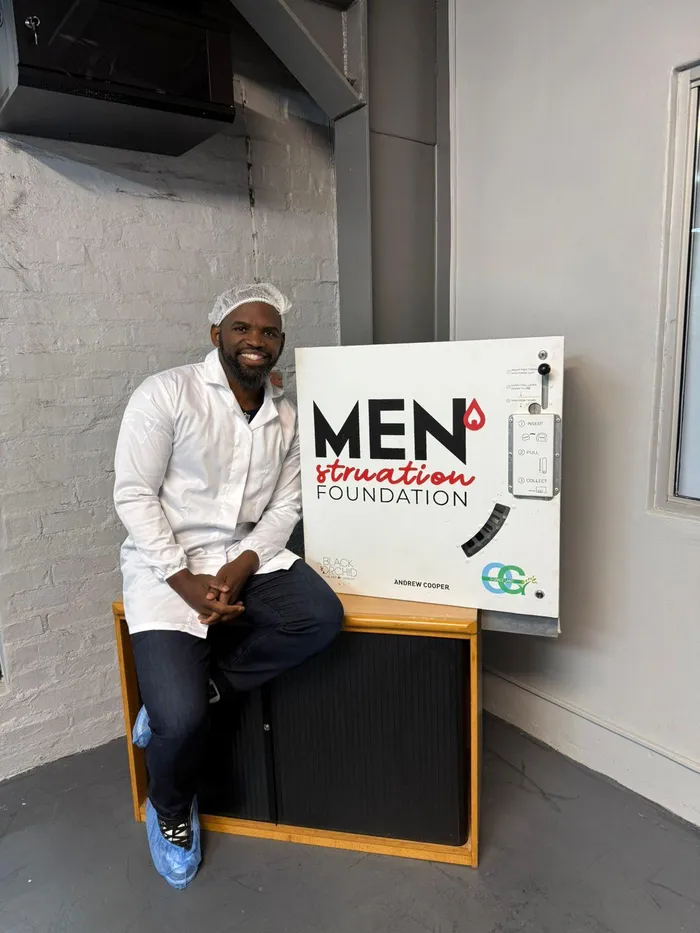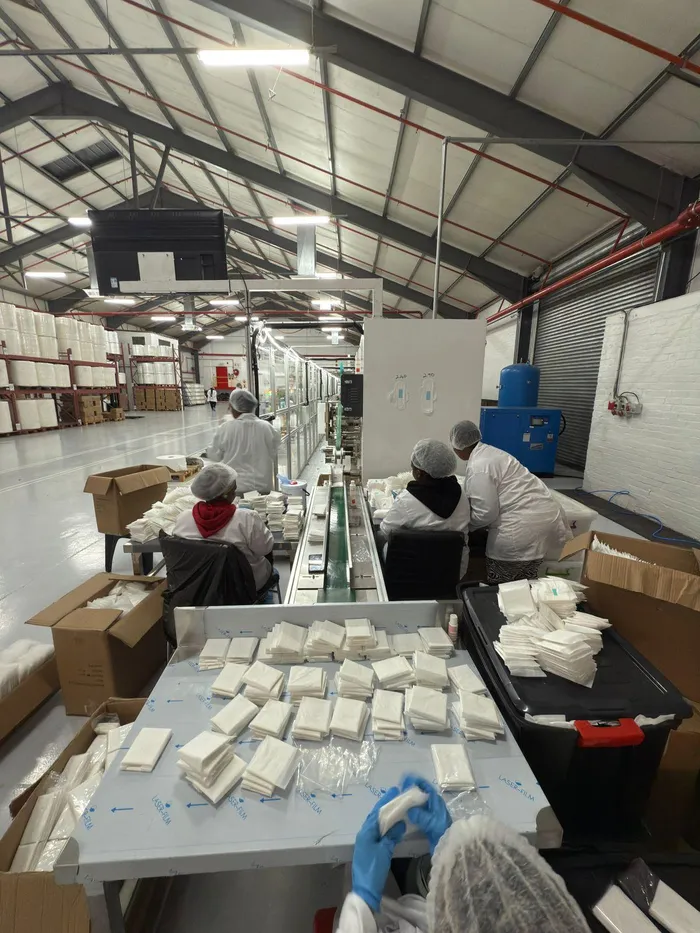MENstruation Foundation's Padco factory tackles period poverty head-on

Co-founder Siv Ngesi inside Padco, the MENstruation Foundation’s new sanitary pad factory – built to fight period poverty with dignity and impact.
Image: Supplied
A new sanitary pad factory in Paarl is promising to change the lives of millions of girls and women across South Africa.
The MENstruation Foundation has officially launched Padco – its very own manufacturing plant – to produce the Agojie Pad, a high-quality sanitary pad created to tackle period poverty head-on.
At the heart of this initiative are actor and comedian Siv Ngesi and co-founder Marius Basson.
What began as a conversation between friends eventually turned into a national movement focused on one goal: making sure no girl misses school – or any opportunity – because of her period.
The idea began to take root years earlier when Mr Ngesi was walking past the Italian embassy and noticed a homeless woman sleeping outside.
He found himself wondering: What do women do when they have their period and are living on the streets? He shared the thought on Facebook, and the post went viral.
That moment sparked his very first sanitary pad drive, held on his birthday, nine years ago.
“If men bled once a month, sanitary pads would be free,” said Mr Ngesi.
“This isn’t just a women’s issue – it’s a human one.”
The Foundation estimates that more than seven million girls and women in South Africa miss four to five days of education, work, or sport each month due to lack of access to menstrual products.
That adds up to around 240 million school days lost every year – a staggering figure that highlights just how urgent the issue is.
To address it, the MENstruation Foundation designed a sanitary pad dispensing machine project, which installs custom-built vending machines in girls’ bathrooms at schools and community spaces.
These machines discreetly provide one free pack of pads each month, restoring dignity and protecting education.
The launch of Padco means that these pads – now known as the Agojie Pads – will be made locally and affordably, with the capacity to scale up quickly.
Currently, the factory produces 450 pads per minute, or approximately 192 000 pads in an eight-hour shift.
“We’re only running one shift right now,” said Mr Ngesi, “but we can triple that.”

Inside Padco: The fully operational factory where Agojie Pads are produced – up to 192 000 per shift – helping keep girls in school and restoring dignity across communities.
Image: Supplied
Inspired by the all-women Agojie warriors of West Africa – made famous in the film The Woman King, in which Mr Ngesi had a small role – the pads carry the spirit of strength and defiance.
“Women have been fighting injustices for centuries,” said Mr Ngesi.
“The Agojie name honours that. If you look at the letter ‘O’ in our logo, there’s even a spear hidden in it.”
The foundation also offers white-label manufacturing, meaning other NGOs, schools, and charities can partner with them to produce pads under their own brand names.
“If you’ve got an idea or you want to work together, we’re happy to chat,” said Mr Ngesi.
“We’ve had companies approach us already. We just quoted for a school that wanted their own branded pads.”
The push for collaboration is part of a bigger vision.
“Success for me,” said Mr Ngesi, would be not needing the MENstruation Foundation anymore.
"I want to shut it down one day because the need is gone. Until then, we’re working toward being one of the biggest sanitary pad brands in Africa.”
So far, the foundation is already making an impact. They estimate that their programme is saving up to half a million school days every month.
At some schools, they have booklets where girls write about how much it has helped, from staying in class to saving money.
“It’s awful to think that some women are forced to choose between buying bread or buying sanitary pads,” Mr Ngesi added.
Despite the success, the project has faced surprising resistance, including pushback from women who feel menstruation initiatives should only be led by women.
“That’s just ridiculous,” said Mr Ngesi.
“Marius and I are both very competitive people. The more they push back, the harder we go.”
Mr Ngesi believes that this kind of thinking stems from how society raises boys.
“I think men and boys were failed from an early age,” he said.
“When a boy has a mother or a sister, he should be learning about menstruation at the same time as girls do.”
He recalls being in school when the menstruation and sex education talks happened, and the boys were told to leave the hall.
“Looking back, they should have made all of us sit together and learn. That’s how we break the stigma.”
The MENstruation Foundation is now calling on government, corporates, and the public to step up. They estimate eight million women in South Africa can’t afford sanitary pads monthly, and four million of those are still in school or university.
“If you give just R120 a month, you’ll be giving two young girls pads for a whole year.”
They also hope to expand across southern Africa, with machines already installed in Botswana, Swaziland, and Lesotho.
“We want to flood the market with the most affordable sanitary pads ever,” Mr Ngesi said.
Their message is clear: No stigma. No shame. No missed opportunity. The mission continues – boldly, sustainably, and with dignity.
For more information or to support the work, visit: www.menstruation.foundation
Related Topics: